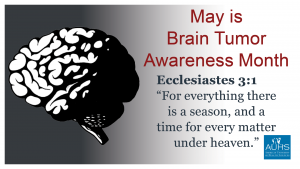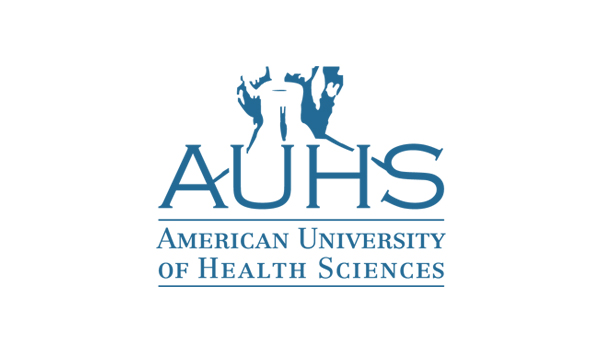 Romans 8:38-39 For I am sure that neither death nor life, nor angels nor rulers, nor things present nor things to come, nor powers, nor height nor depth, nor anything else in all creation, will be able to separate us from the love of God in Christ Jesus our Lord.
Romans 8:38-39 For I am sure that neither death nor life, nor angels nor rulers, nor things present nor things to come, nor powers, nor height nor depth, nor anything else in all creation, will be able to separate us from the love of God in Christ Jesus our Lord.
May is National Brain Tumor Awareness Month, and American University of Health Sciences (AUHS) encourages you to seek information about brain tumors, learn about its symptoms and treatments, and help spread awareness! Here are 10 facts you should know about brain tumors and brain cancer.
- What is a brain tumor? A brain tumor is “an abnormal growth of tissue in the brain or central spine that can disrupt proper brain function. Doctors refer to a tumor based on where the tumor cells originated, and whether they are cancerous (malignant) or not (benign),” according to braintumor.org.
- Brain tumors come in all shapes and sizes. There are over 120 types of brain and central nervous system (CNS) tumors, and brain and spinal cord tumors are different for every individual. These tumors can form in different areas, develop from different cell types, and may have different treatment options, according to braintumor.org.
- The symptoms of brain tumors can vary depending on their type and location, and there have been cases where a person suffering from a brain tumor may experience no symptoms at all. Common symptoms of a brain tumor include recurrent headaches, memory loss, poor coordination, vision problems, changes in behavior or personality, difficulty in speech, and unexplained nausea or vomiting.
- In 2017, an estimated 79,270 new cases of primary malignant (cancerous) and non-malignant (non-cancerous) brain and other CNS tumors are expected to be diagnosed in the United States, according to The Central Brain Tumor Registry of the United States (CBTRUS).
- Approximately one-third of brain and CNS tumors are malignant (cancerous), according to the American Brain Tumor Association (ABTA).
- Cancers of the brain occur in people of all ages but more frequently in two age groups: Children younger than 15 years old and adults 65 years and older, according to the Centers for Disease Control and Prevention (CDC).
- An estimated 16,947 deaths will be attributed to primary malignant brain and other CNS tumors in the US in 2017, according to The Central Brain Tumor Registry of the United States (CBTRUS).
- Brain and CNS tumors are the third most common cancer occurring among adolescents and young adults (ages 15-39) and the third most common cause of cancer death in this age group, according to the American Brain Tumor Association.
- The five–year relative survival rate in the US following diagnosis of a primary malignant brain or other CNS tumor is 34.7% (33.5% for males and 36.1% for females), according to The Central Brain Tumor Registry of the United States (CBTRUS).
- Brain tumors have the highest per-patient initial cost of care for any cancer group, with an annualized mean net costs of care in 2010 in the United States well over $100,000 per patient, according to braintumor.org.
About American University of Health Sciences
AUHS is a private, minority owned, minority serving, Christian-based university whose mission is to educate and equip students with life careers and to produce quality health care professionals for the community, the nation, and the world. It is a university where appreciation of life and one’s spiritual reason for existence can be nurtured.
AUHS offers a Bachelor of Science in Nursing (BSN), a Bachelor of Science in Pharmaceutical Sciences (BSPS) and a Master of Science in Clinical Research (MSCR). To request more information, email admissions@auhs.edu or call (562) 988-2278. For the latest news, pictures and videos of American University of Health Sciences’ events, like us on Facebook @auhs.edu and follow us on Twitter @AUHS_Campus and Instagram @auhsedu.


